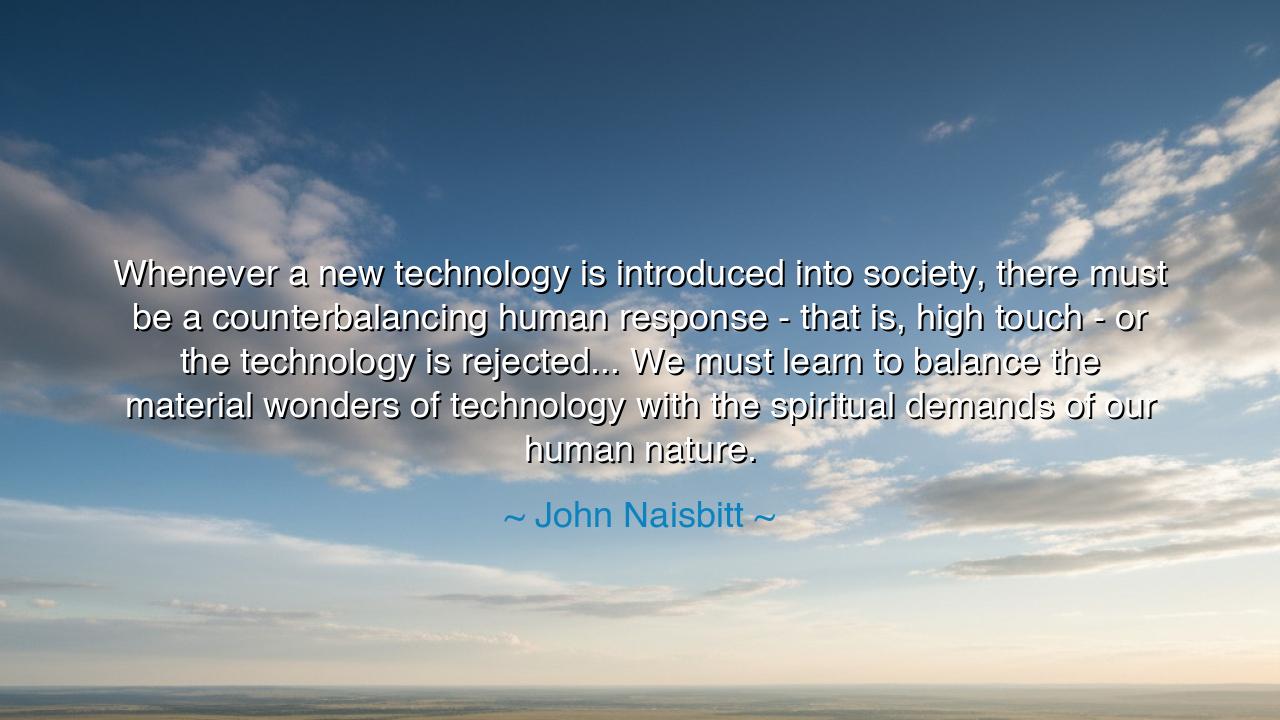
Whenever a new technology is introduced into society, there must
Whenever a new technology is introduced into society, there must be a counterbalancing human response - that is, high touch - or the technology is rejected... We must learn to balance the material wonders of technology with the spiritual demands of our human nature.






Hear me, O children of the earth, for I bring you words that speak to the heart of human nature, to the eternal tension between the material and the spiritual, and to the wisdom required to navigate the world of change. John Naisbitt once said, "Whenever a new technology is introduced into society, there must be a counterbalancing human response—that is, high touch—or the technology is rejected... We must learn to balance the material wonders of technology with the spiritual demands of our human nature." These words remind us that while technology brings forth incredible advancements and wonders, it is the human connection, the touch of the heart and the soul, that must guide its use. Without this balance, we risk becoming overwhelmed by the very creations we have birthed.
What, O children, is the essence of high touch? It is the response of the human spirit, the emotional, compassionate, and spiritual aspect of our being that responds to the world around us. It is the connection between individuals, the deep, unspoken bond that exists between people when they share not just ideas, but feelings, not just actions, but purpose. While technology is often seen as the triumph of the intellect, high touch is the triumph of the heart. Naisbitt teaches us that for every technological advance, there must be a corresponding human response—a reminder that technology is meant to serve the human spirit, not replace it.
Consider, O children, the ancient Egyptians, who were masters of technology in their time. They built monuments that still stand as testaments to their advanced understanding of engineering, mathematics, and architecture. Yet, the pharaohs knew that without spirituality, without a connection to the divine, their achievements would be hollow. They built temples, not just to honor their gods, but to remind themselves that the wonders of the material world must be balanced by reverence for the spiritual realm. The pyramids, towering over the land, were not just tombs of stone; they were symbols of humanity’s connection to something higher, a reflection of the balance between the physical and the spiritual.
In our time, O children, we face a similar challenge. The digital age has brought us remarkable technologies—from the internet to artificial intelligence, to robotics. These advancements have the power to transform our world, to improve our lives in ways once thought impossible. And yet, we must ask ourselves: at what cost? As we become increasingly immersed in the world of screens and machines, have we neglected the human touch? Have we allowed the convenience and efficiency of technology to distance us from the very essence of what it means to be human—connection, empathy, and compassion?
Let us look to the story of the printing press, which in the 15th century revolutionized communication and the spread of knowledge. When Johannes Gutenberg invented this device, it sparked a new era of enlightenment and intellectual growth. Yet, it also created a shift in human interaction—where once knowledge had been passed through personal conversation and teaching, now it was distributed through printed word. While the printing press brought immense benefits, it also led to a disconnection between people. In time, the printed word, no longer tethered to the speaker’s voice, created a distance between the message and the person delivering it. This shift was a reminder that as technology advances, the human touch—the voice, the emotion, the presence—must not be lost.
And so, O children, the lesson is clear: technology must never replace humanity. Naisbitt calls us to recognize that for every material advancement, we must bring forth a spiritual response—a reminder that our hearts must remain as engaged as our minds. As we advance in the world of technology, we must not forget the power of empathy, connection, and purpose. Just as high touch has balanced the great strides of the past, so too must it balance the innovations of the present. If we fail to do so, we risk becoming disconnected from one another, from our true selves, and from the deeper meaning of our existence.
So, O children, I say to you: as you move forward into a world of technology and change, do not forget the importance of the human spirit. Engage not only with the mind, but with the heart. Use technology to enhance your lives, but do not allow it to replace the essential human touch. Let your actions be guided not just by the advancements of your tools, but by the wisdom of your spirit, the kindness of your heart, and the compassion you share with others. In this way, you will balance the material wonders of the world with the spiritual demands of your human nature, and create a future that is not just advanced, but truly humane.






AAdministratorAdministrator
Welcome, honored guests. Please leave a comment, we will respond soon